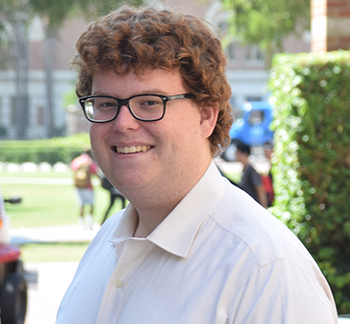
Dan Morgan-Russell
Dan Morgan-Russell has always been very good at arguing for the importance of international action against genocide.
As a member of his high school debate team in Denver, his most successful speeches were always the ones in which he spoke about human rights violations and the need for the international community to intervene. Naturally, as an undergraduate at the University of Southern California, he decided to major in international relations and wrote several papers about the Rwandan Genocide.
But a turning point came when he happened to pick up They Fight Like Soldiers, They Die Like Children, by retired general and humanitarian Romeo Dallaire, in a small library while he was traveling in Ireland. He “devoured it,” he said, and then read Dallaire’s biography, Shake Hands with the Devil. From then on, he knew he wanted to be involved with raising awareness of international crises.
As executive producer of the Trojan Vision TV show Platforum, Morgan-Russell endeavored to report on international stories, and he was stunned to land an interview with Dallaire himself when he visited USC last year.
Morgan-Russell reached out to USC Shoah Foundation in January to see if any of its staff could appear on Platforum and also to inquire about interning at the Institute. He began working in the executive office with managing director Kim Simon and program administrator Aaron Zarrow.
He quickly became passionate about the importance of testimony in raising awareness for genocide and other crimes against humanity. Morgan-Russell pointed out that testimony allows us to “meet” the survivors and victims of violence who would otherwise be mere statistics. If Americans feel as close of a bond to these people in need as they feel to the soldiers who could be sent to protect them, they might be more inclined to support American efforts to intervene in humanitarian conflicts around the world.
“While we know American troops, we don’t know Rwandan genocide survivors. We don’t know Holocaust survivors. We don’t know survivors from Khmer Rouge or Sudan,” Morgan-Russell said. “So the fact that USC Shoah Foundation has testimony that allows people to in a sense meet these survivors and hear their stories and hear about their childhoods, jobs, relationships, everything that makes them people, so they don’t solely exist in context of genocide, it means we ascribe humanity to genocide survivors.”
Morgan-Russell said that Stalin had a point when he said that while one death was a tragedy, one million deaths was a statistic. It can be difficult for people to grasp the magnitude of events like the Holocaust or Rwandan Tutsi Genocide. But testimony can help people care about each individual victim and realize how important it is to take action when genocidal situations threaten to arise.
“Westerners need to realize that for the very low cost comparatively of economic aid or sending peacekeepers who are unlikely to be engaged in fights but who can actually protect people, we can save a lot of lives and do a lot of good,” he said. “We need to realize there is significant economic and human upside to taking a stand in these kinds of crisis situations.”
At USC Shoah Foundation, Morgan-Russell helps draft communications to the Board of Councilors and other supporters and partners, and completes other administrative tasks.
He said it’s rewarding to work at USC Shoah Foundation and to feel like he’s making a difference even as a senior in college.
“Here I’m having a serious impact that will hopefully change lives for decades and centuries to come,” he said.